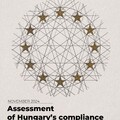Eleven thousand respondents filled out a questionnaire to inform a birthing experience map published by K-Monitor, Funky Citizens and EMMA Association. Hungarian data collected for this study indicates that gratitude payments are involved in 68 percent of deliveries, with an average amount of HUF 111,000 [EUR 315]. Based on our estimates, such gift giving in Hungarian obstetrics totals around HUF 7 billion [EUR 20 million] every year.

(Pic by Janka Ván)
The most well-known form of corruption in the Hungarian health care system might be the phenomenon called "gratitude money", the informal payment patients or their relatives make to doctors and other health care workers in hope of better service, kinder treatment, or simply out of habit. In the summer of 2020, K-Monitor and EMMA Association created the website igyszultem.hu (which would literally translate to “howigavebirth.hu”), asking mothers who gave birth in Hungarian public hospitals in the last 10 years to share their childbirth experiences, with the aim of understanding the immediate effects of gratitude payments better. By October, we received over 11,000 responses. Funky Citizens published a Romanan equivalent.
It is important to note that we counted every undocumented payment to be gratitude money: any payment that was not made in exchange for an invoice, typically in an envelope. Often, these payments are made even when the patient is not grateful at all, although many of the responses we received indicate that the payment can be a sign of thankfulness.
igyszultem.hu - how we processed the data
The data below represent the deliveries that took place between 2016 and 2020 (as relevant official statistics were missing for the cases before 2016, we omitted the deliveries before that year). Furthermore, we weighted the data by territorial aspects and the mode of delivery to get a representative sample of births based on the available official data. Naturally, self-selection bias and the fact that we gathered our data online might distort our data towards respondents who are well-off and interested in public affairs.
The Majority of Hungarian Children Are Born In Corruption
Gratitude payments are involved in 68 percent of Hungarian deliveries, whether upon request (15%), or volunteered by the mother. The latter is much more common, however. Because demanding gratitude money constitutes a criminal offence, the expectation of it might be suggested to the patient by doctors through non-verbal communication. In 97 percent of the cases, the transaction takes place after the child is born. The place of delivery matters, too: in the region of Central Hungary, gratitude money is paid in 76 percent of deliveries, while in Central Transdanubia,only in 48 percent.
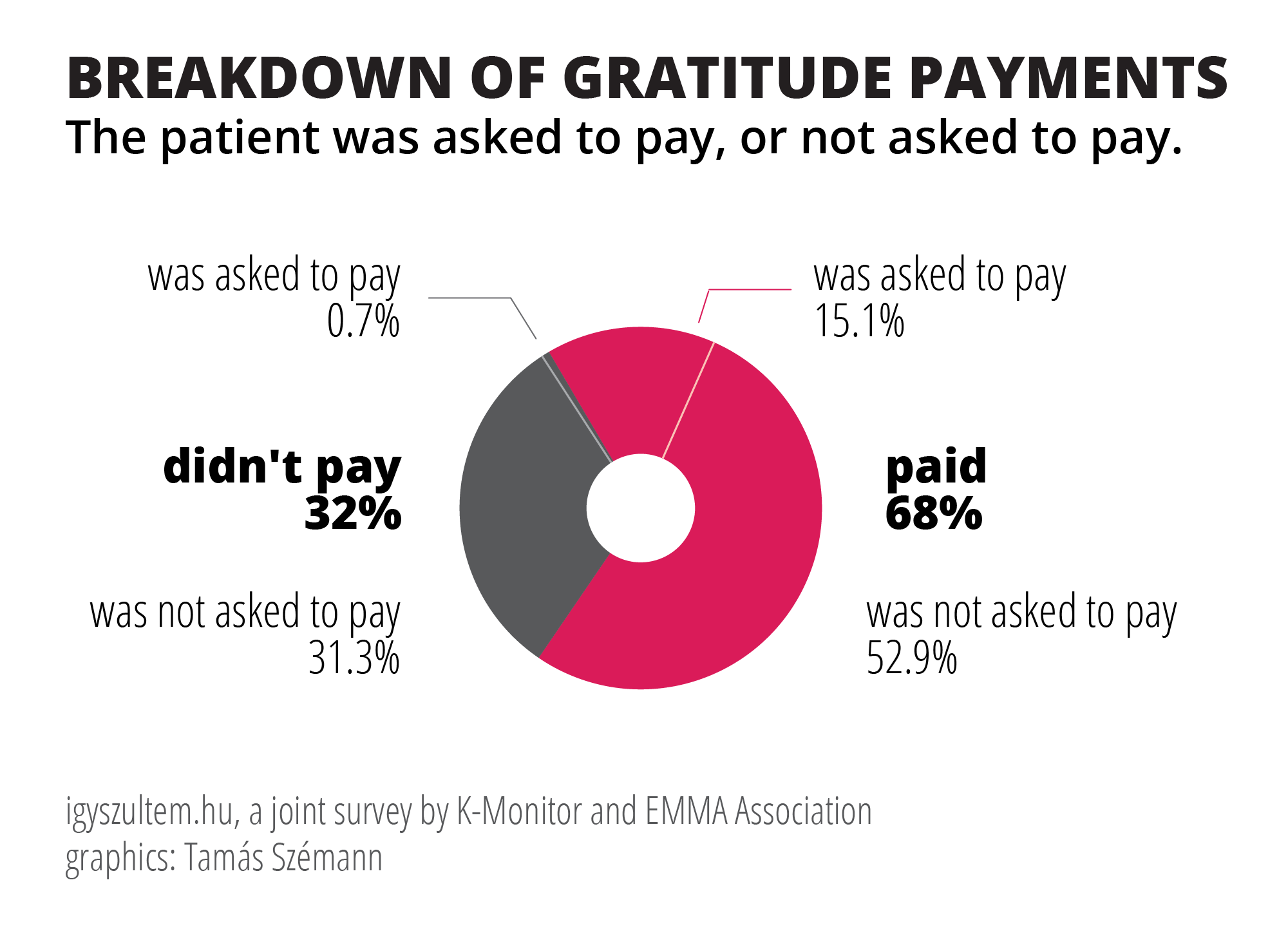
In 88 percent of the reported cases, gratitude money was paid to the doctors, and often, (60%) the midwives get an envelope as well:
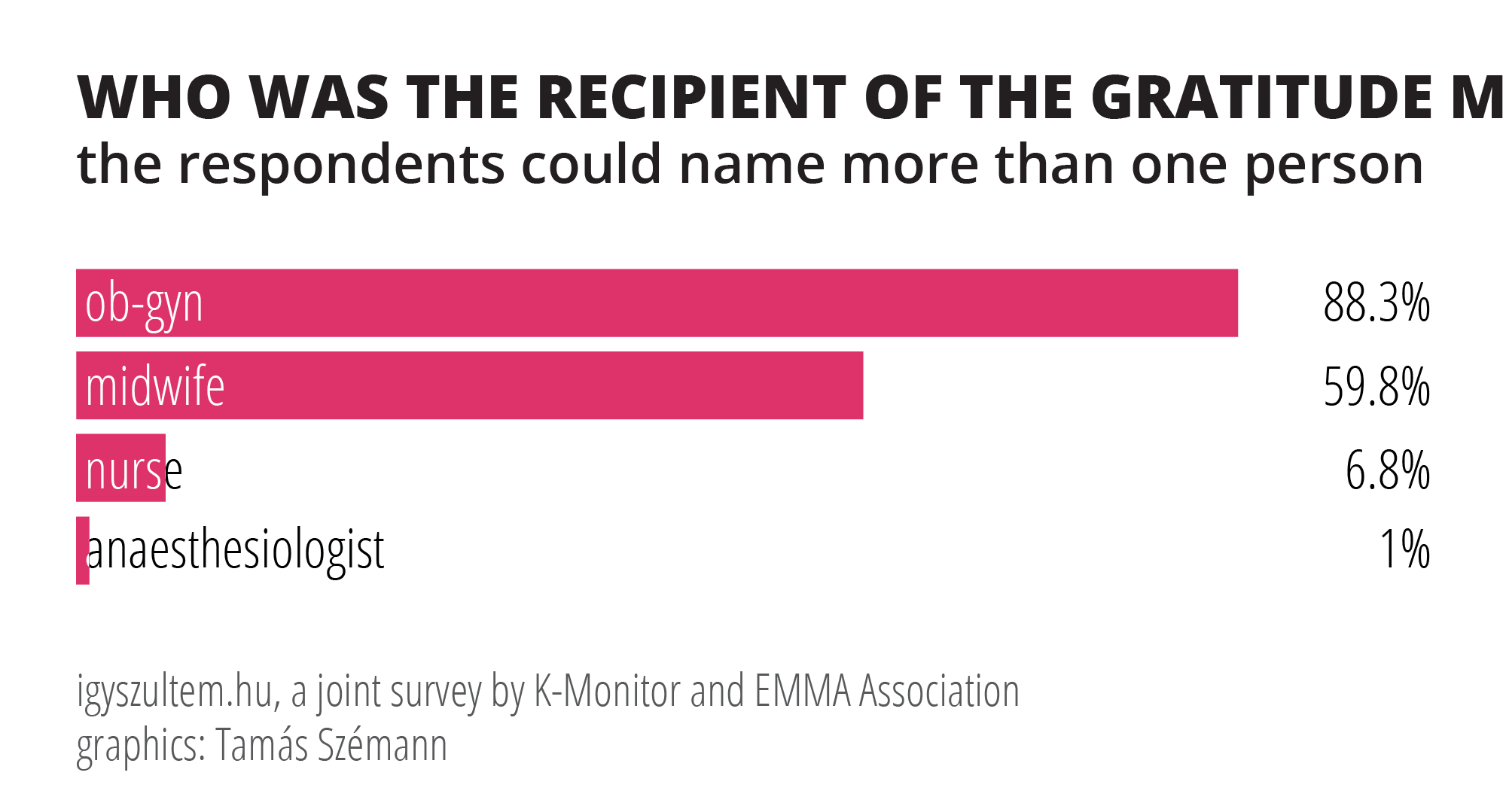
In 97 percent of the cases the transaction takes place after childbirth:
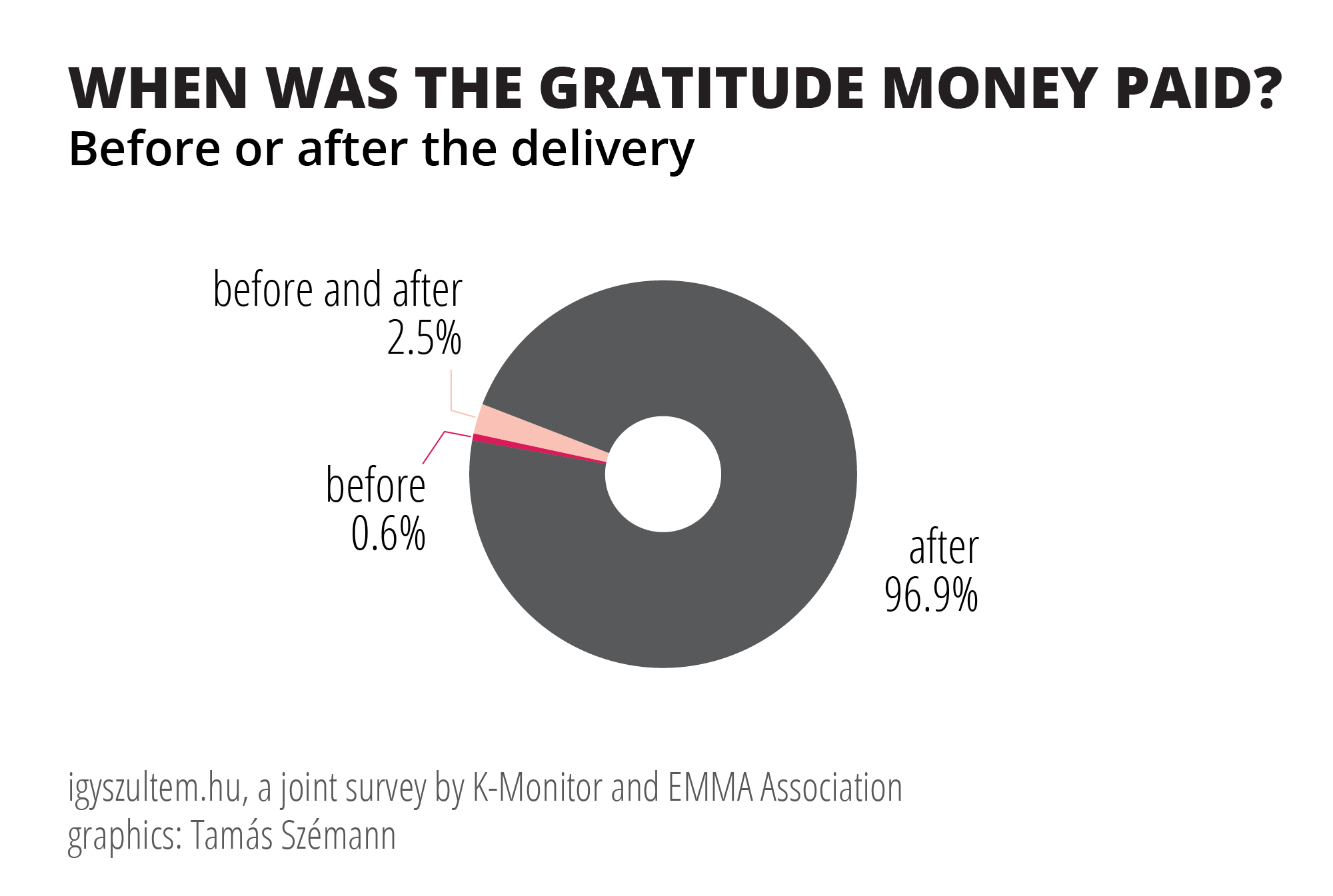
The geographic location of delivery matters, too: in the region of Central Hungary gratitude money is paid for 76 percent of deliveries, in Central Transdanubia however, only for 48 percent.
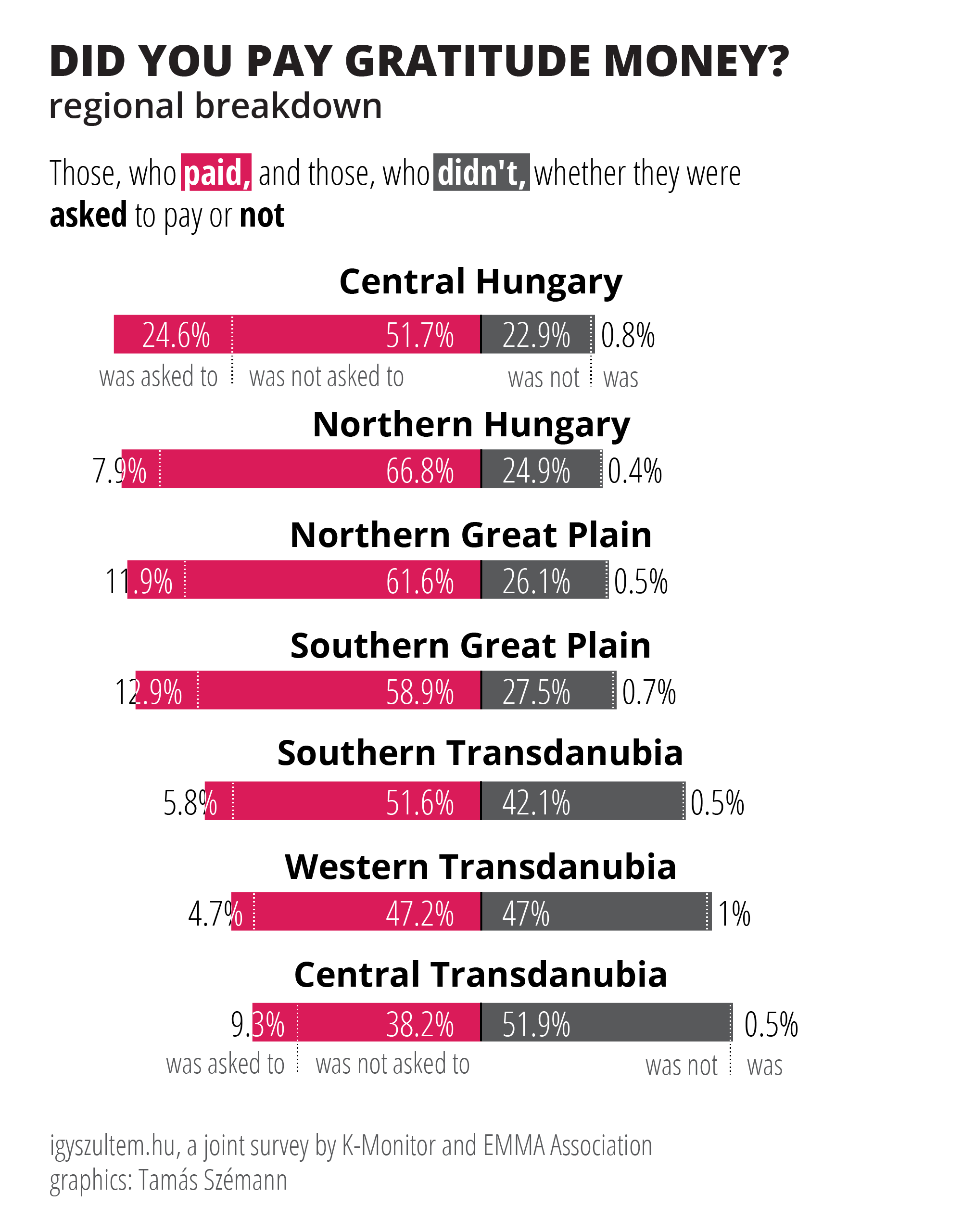
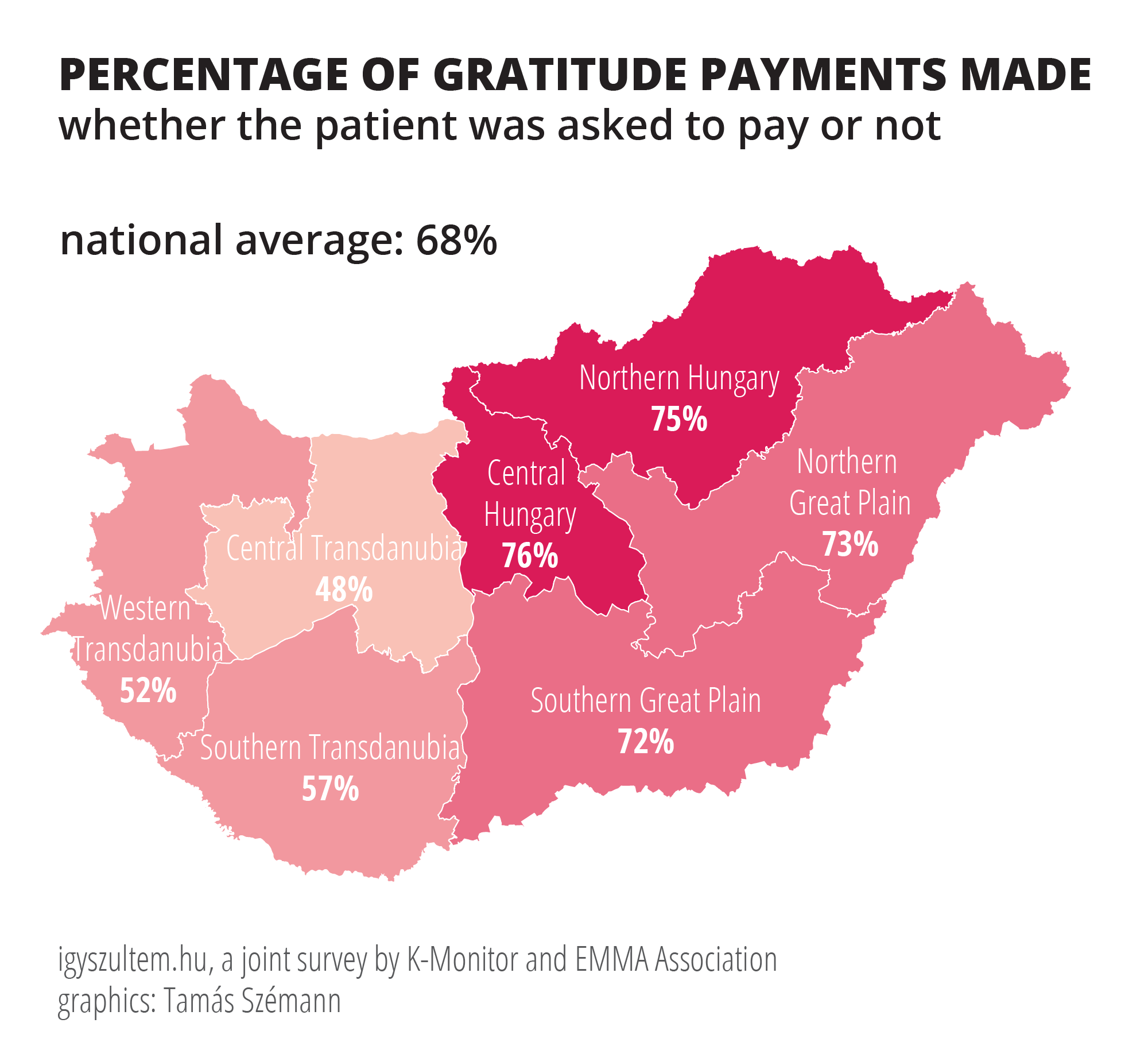
Respondents listed several reasons for making gratitude payments. The most common reason was to have a preferred doctor or midwife stand by to help deliver the baby (55 percent). The second most common reason was gratitude (45.5 percent). Thirty-eight percent of respondents paid in order to ensure the availability of their doctor or midwife during pregnancy, which could be considered as an illegal stand by fee for doctors, similarly to making informal payments to have a specific obstetrician on stand by. Thirty percent of respondents paid for more attention, 25 percent paid for their birthing needs to be taken into account (eg. to avoid a C-section), 22.5 percent paid for better care and 15 percent for better circumstances, all of which can be considered as bribes for “extra services” in a public hospital. A share of them definitely not an extra, but treatment that is considered normal in most EU countries. Eight percent of women paid because they felt they had to, expecting nothing in return.
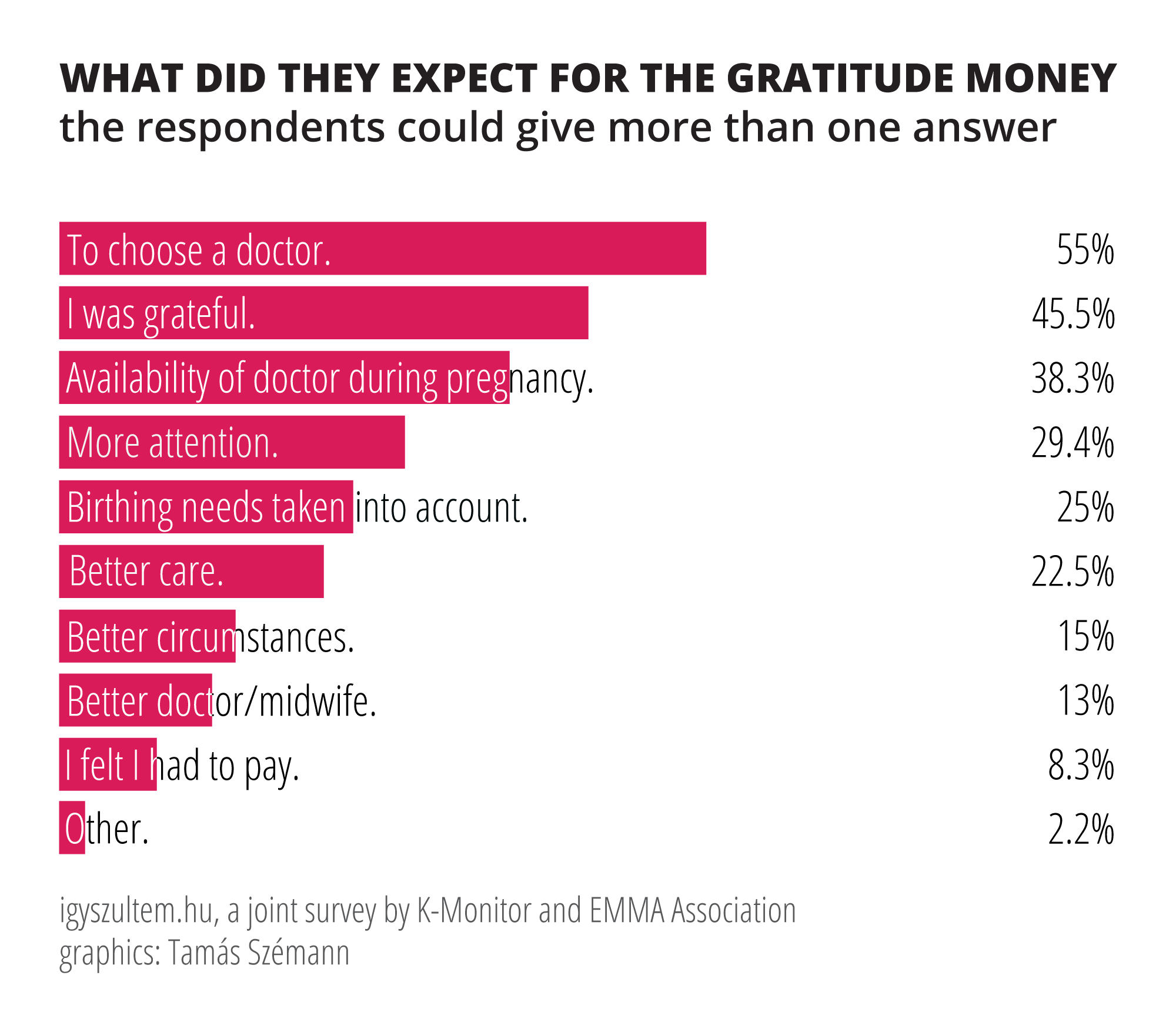
A Hungarian specialty
The system of reserved doctors in obstetrics is a Hungarian specialty absent fromthe public health sectors of other countries, a custom closely linked to gratitude payments. In most cases the doctor previously reserved for the birth will receive a gratitude payment – suggesting that in these cases gratitude money is previously "demanded" or agreed upon.
The system of preferred doctors merits its own study, so we will not go into detail here; we have touched upon this topic several times before. One of the most frequently cited statistics is that over the weekend, the number of deliveries tends to go down considerably, by as much as one-third. Why? Presumably, because the preferred doctor would rather rush or delay the delivery, as they, too, would like to have a restful weekend (even then a high ratio if we assume that planned C-sections happen mainly during weekdays). For the doctor on duty, it wouldn’t really matter -- he or she spends the weekend in the hospital anyway.
65 percent of Hungarian women have their babies delivered by their chosen doctor (and/or a midwife), which may even be an underestimate, as 20 percent of the participants reported that in the end, they were not able to give birth with the doctor they initially wanted. 90 percent of those choosing a doctor paid gratitude money. This figure might show best that gratitude money is not only about gratitude, it is more likely to be an unofficial availability fee. This is also shown by the next figure:
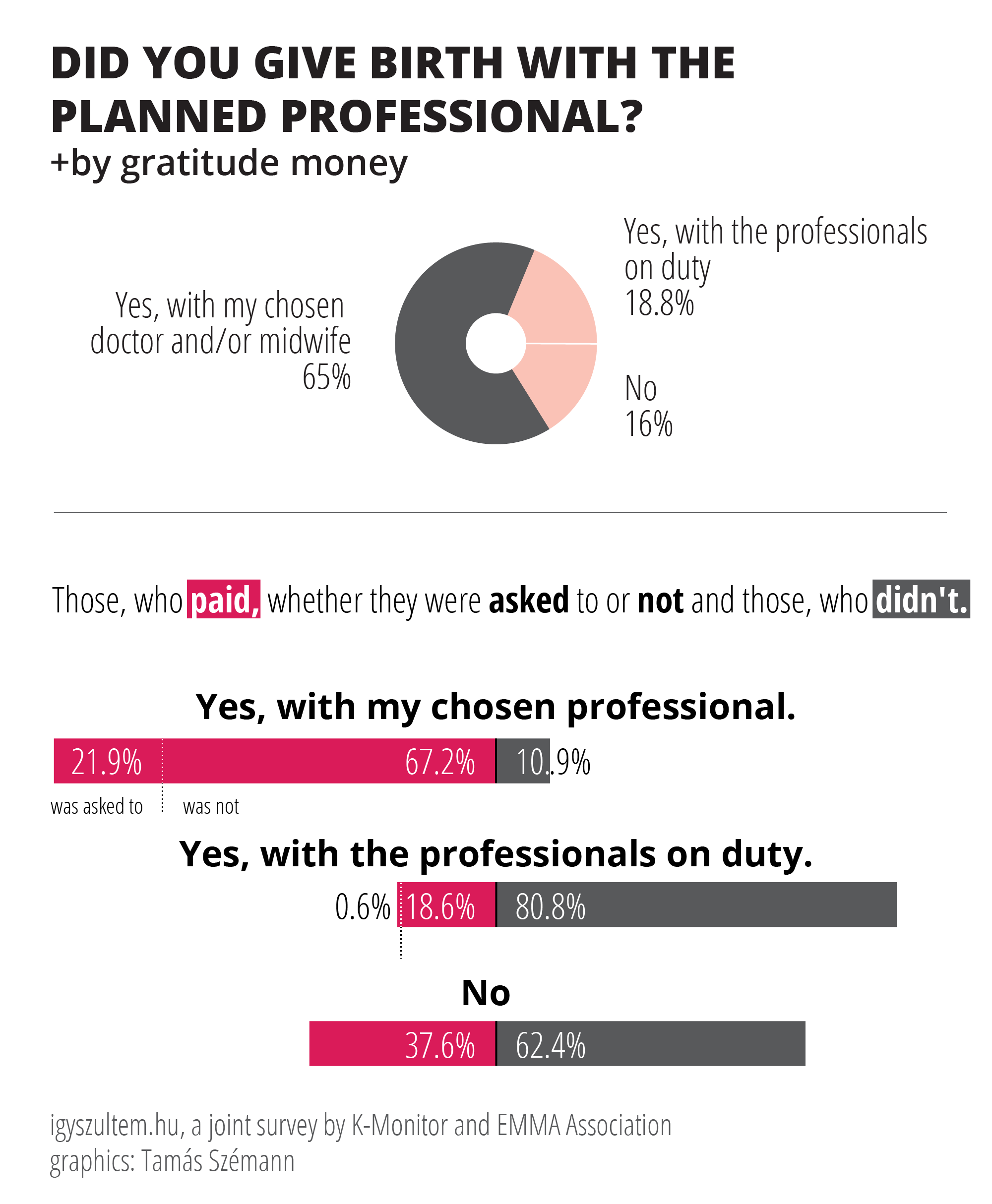
The data gathered over igyszultem.hu also reveals that caesarean sections are more common when the baby is delivered by the patient’s preferred doctor. 43 percent of those giving birth with a preferred doctor had a C-section, while only 29 percent of the babies delivered by the doctor on call were born by caesarean. Labour had to be induced in a quarter of the deliveries reported in our survey. For preferred doctors, this share was 31 percent;for deliveries with the doctor on call only 20 percent. This difference is not accidental and it might be connected to the findings cited above: some chosen doctors seem to adjust the deliveries to their own calendar. Of course, it would be a mistake to explain every C-section or induced labour with gratitude payments and preferred doctors. According to the WHO a caesarean rate of 10-15 percent is acceptable – this is the share of C-sections that save lives. The problem is when the numbers are much higher (or much lower, for that matter).
Of course, apart from the preferred doctor’s calendar, there are other reasons for the high caesarean rate. One reason might be the doctors’ lack of routine in deliveries that seem more complicated, also, doctors often claim that mothers explicitly request a C-section (in our survey this was only confirmed in 3 percent of cases). It is undeniable, however, that the caesarean rate is exceptionally high, and increasing, in Hungary and it seems that the presence of the chosen doctor within the system adds several percentage points to these statistics. In the cases where a midwife delivers the baby on her own (5 percent of deliveries), spontaneous vaginal deliveries are much more common than the average (87 percent), but it is likely that midwives are disproportionately assigned to deliveries where complications are not expected in the first place.
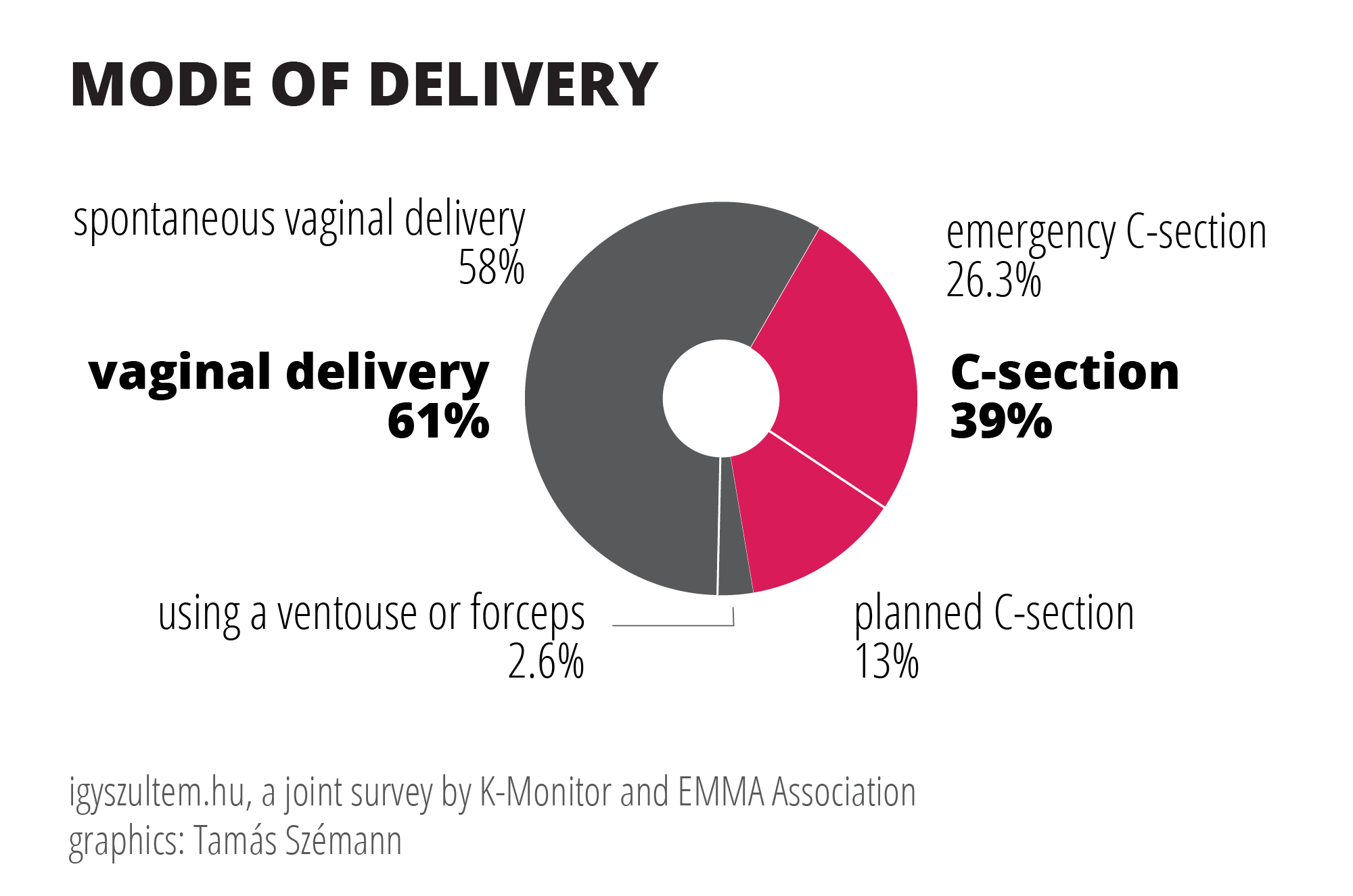
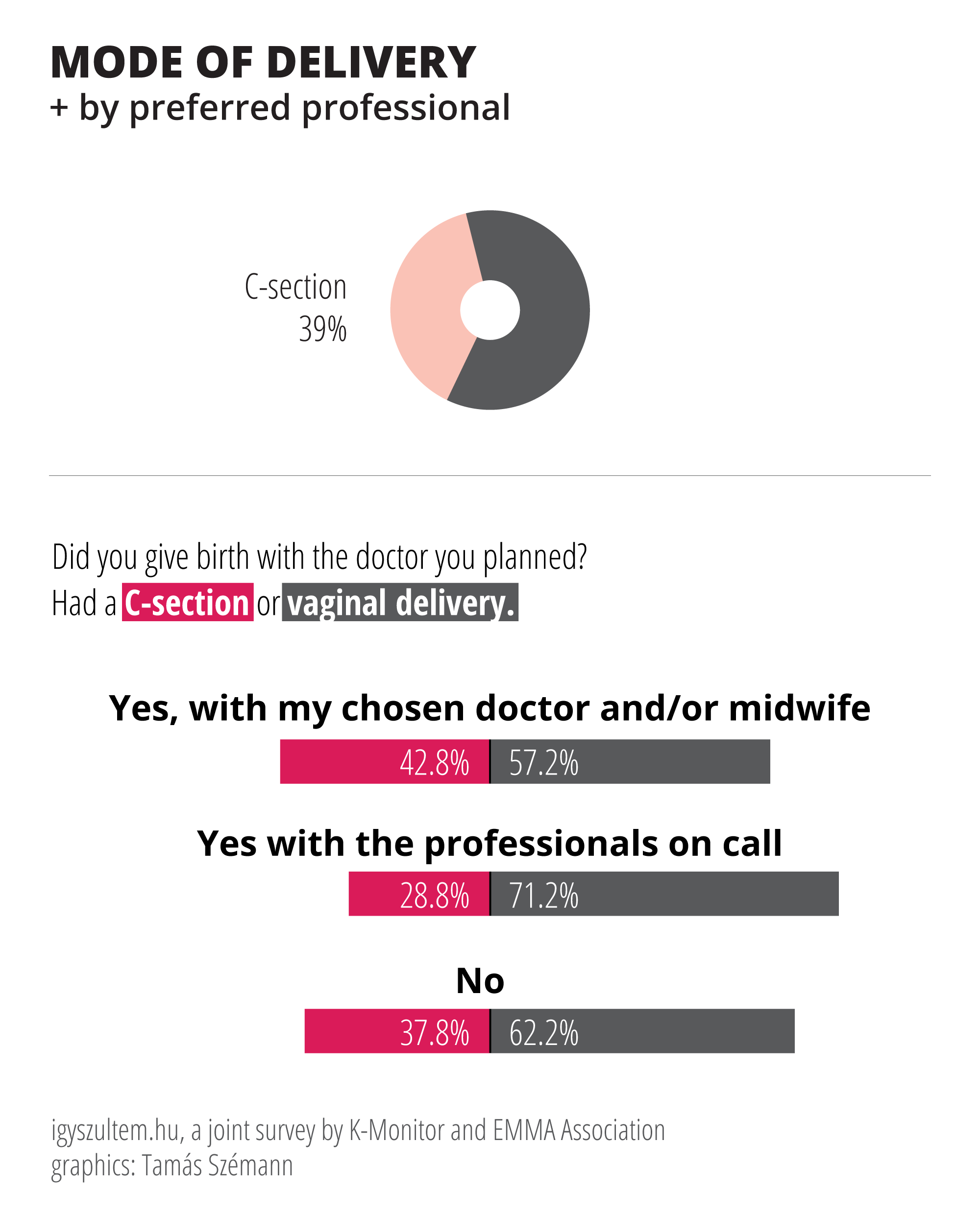
Survey responses are very close to the official Hungarian statistics:
ratio of C-sections was 41% in 2018 and 42% in 2019 according to NEAK.
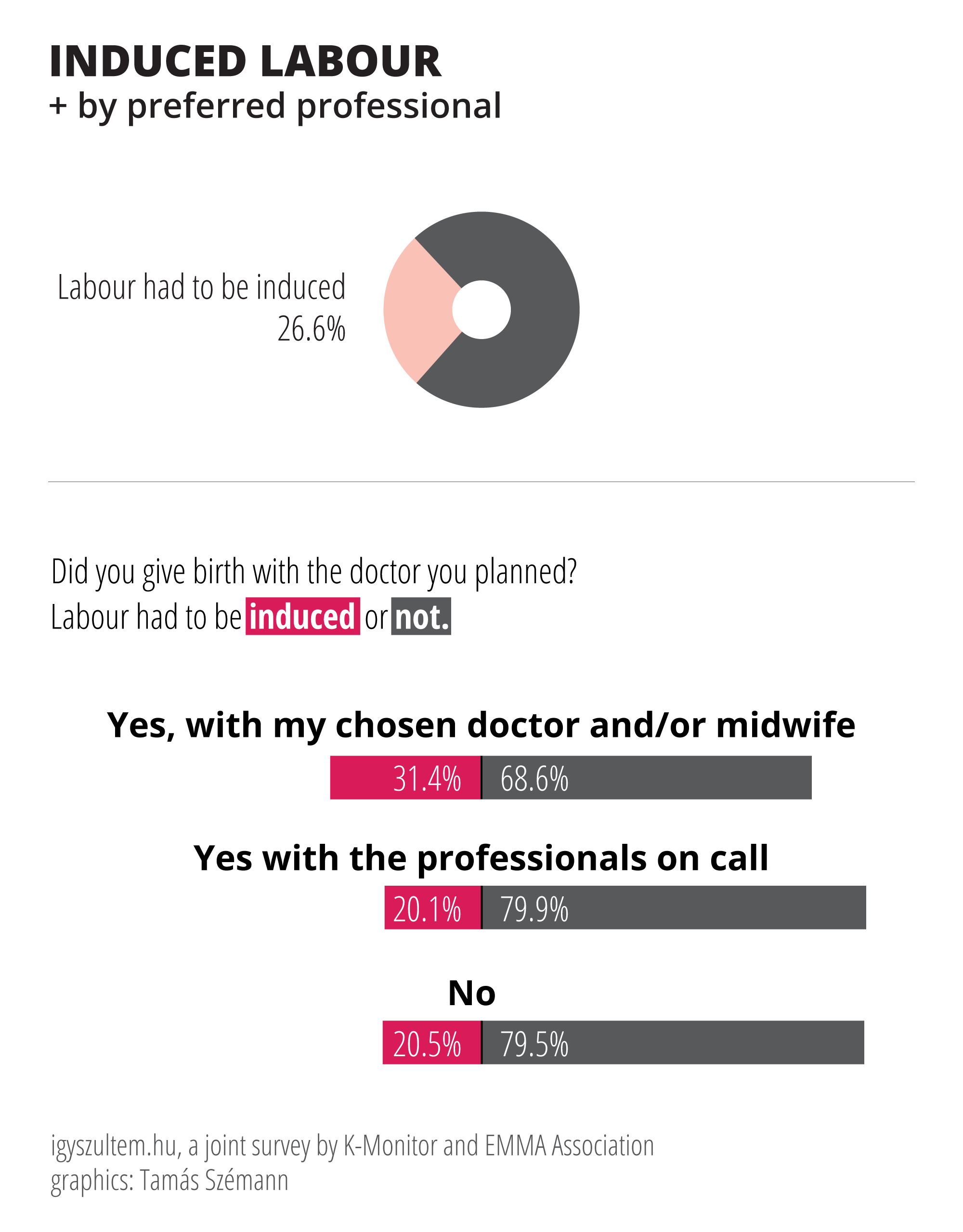
According to the participants, 69 percent of babies were delivered by a doctor and a midwife together. 22 percent were delivered by a doctor alone, 5 percent by a midwife only. There are significant differences between deliveries with and without gratitude payment: gratitude money was paid for 56 percent of the deliveries with a midwife, while that figure is around 70 percent for deliveries led by a doctor or a doctor and a midwife together. It is an interesting fact that apart from a few hospitals, midwives can't deliver a baby on their own in most maternity wards. 3.7 percent of the respondents were not sure who delivered their baby. The share of gratitude payments was the smallest in this group (but still around 40 percent).
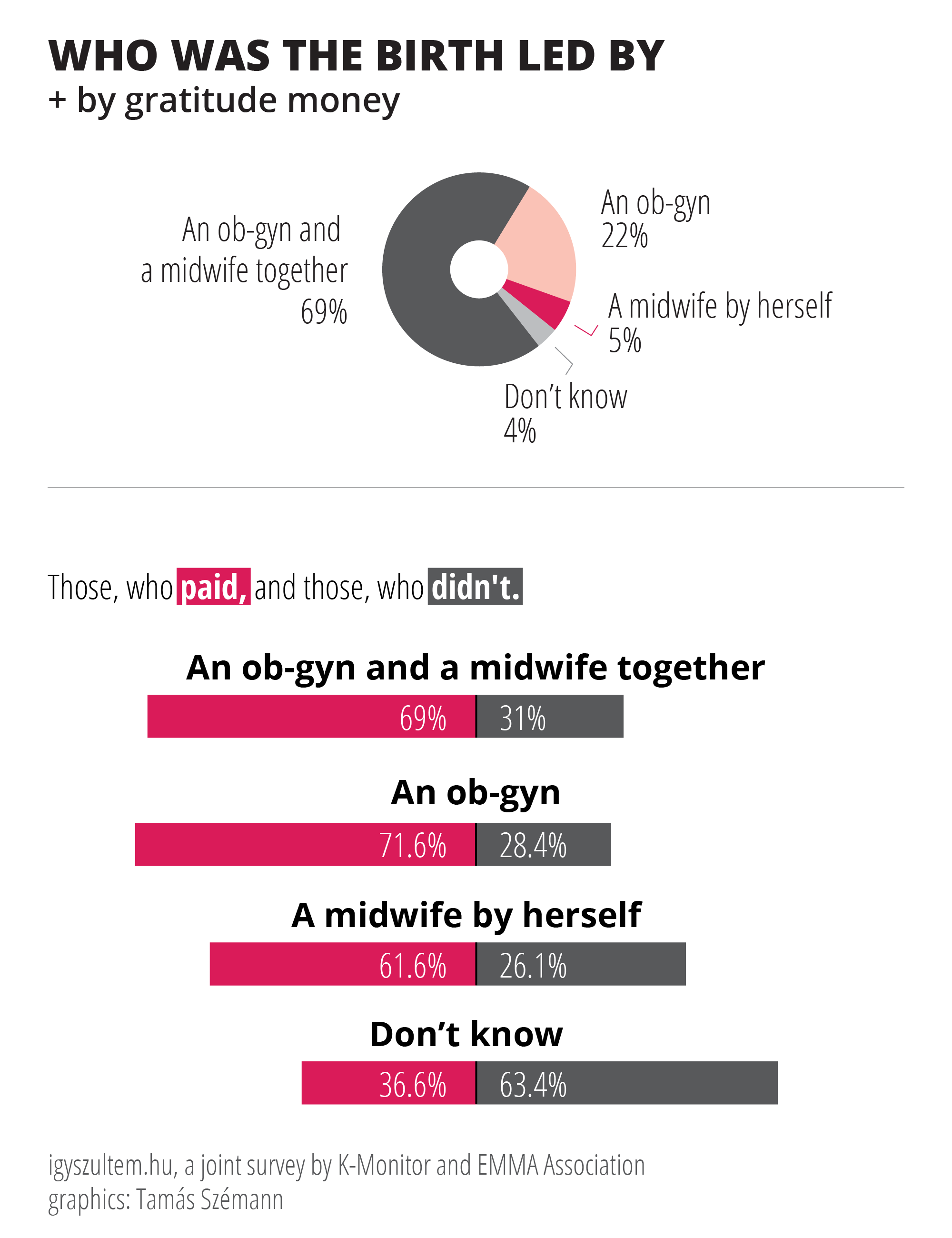
The Wages of Fear
The average amount of gratitude money was HUF 111,000 [EUR 315], the median (midpoint of frequencies) being 100,000 HUF. However, only in a third of the cases (31 percent) did this sum go to a single recipient. The amount of gratitude money shows wide variation, ranging from a few thousand to a million forints. Though the difference is not substantial, it is clear that the amount of gratitude money is higher when it is requested. Based on the annual number of births (approximately 90.000 babies a year), the frequency of gratitude payments (68 percent), and the average amount of gratitude money it is possible to estimate how much money is exchanged in maternity care every year: about HUF 7 billion [EUR 20 million].
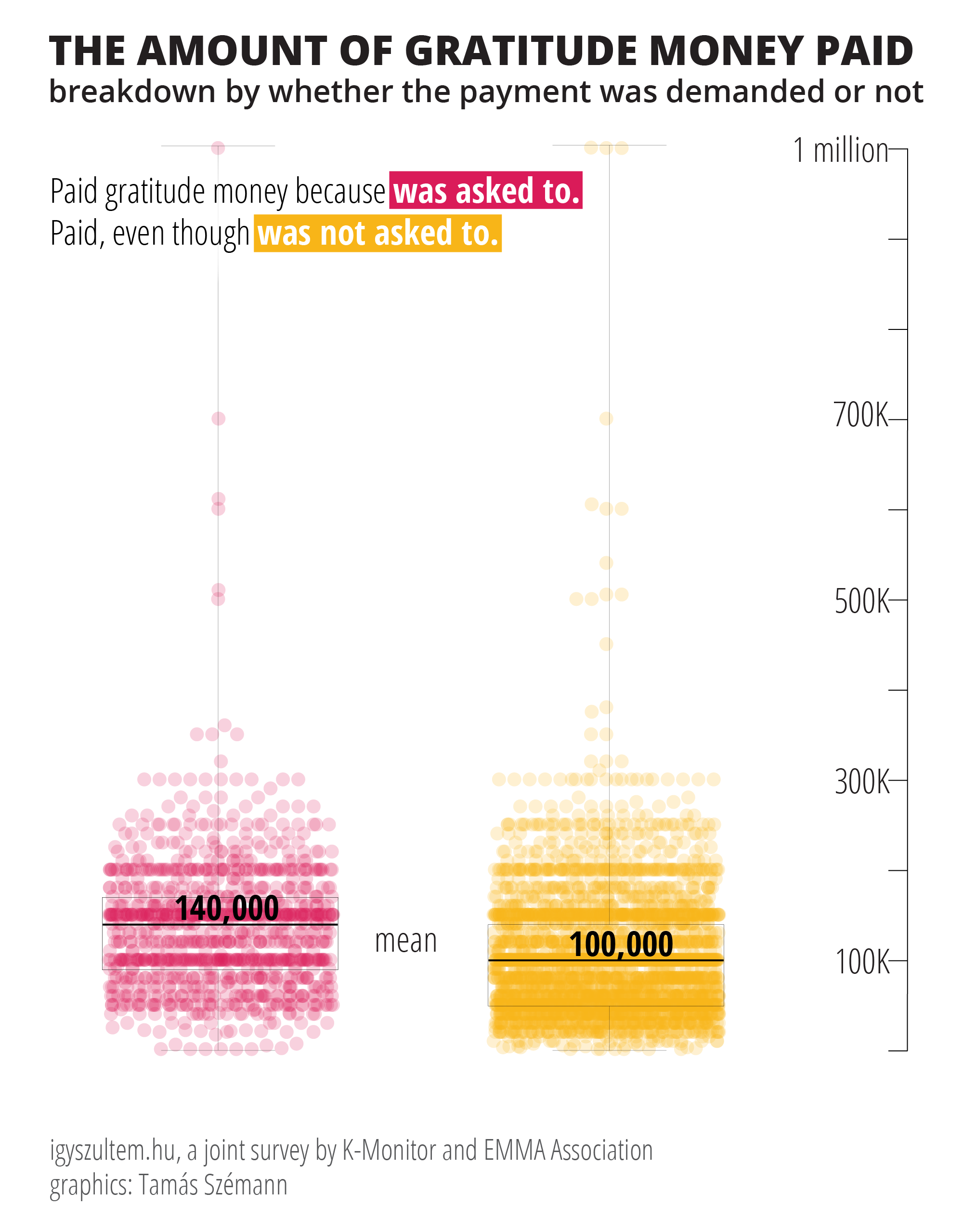
There are significant regional differences in the amount of gratitude money paid. While in Central Hungary, including Budapest, envelopes contain on average HUF 141,000 [EUR 400], in Western Transdanubia the average amount of gratitude money is HUF 76,000 HUF [EUR 215].
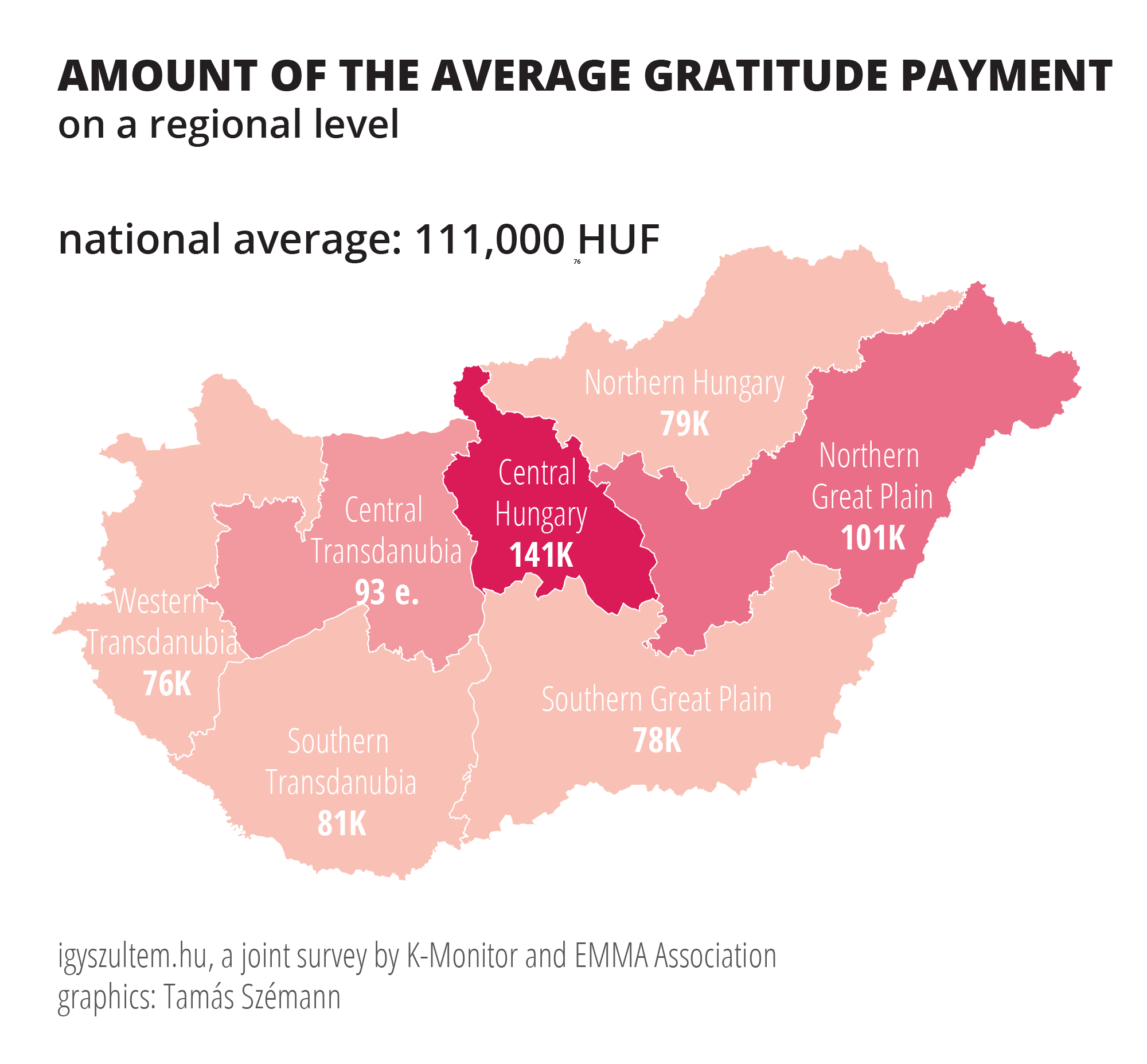
So, How Was it?
Almost 3000 of the 11,000 mothers taking part in our survey shared their narrative birthing experiences as well. Our quick analysis indicates that about 11 percent of the respondents reported a traumatic experience, most often due to ill-treatment and a lack of information.
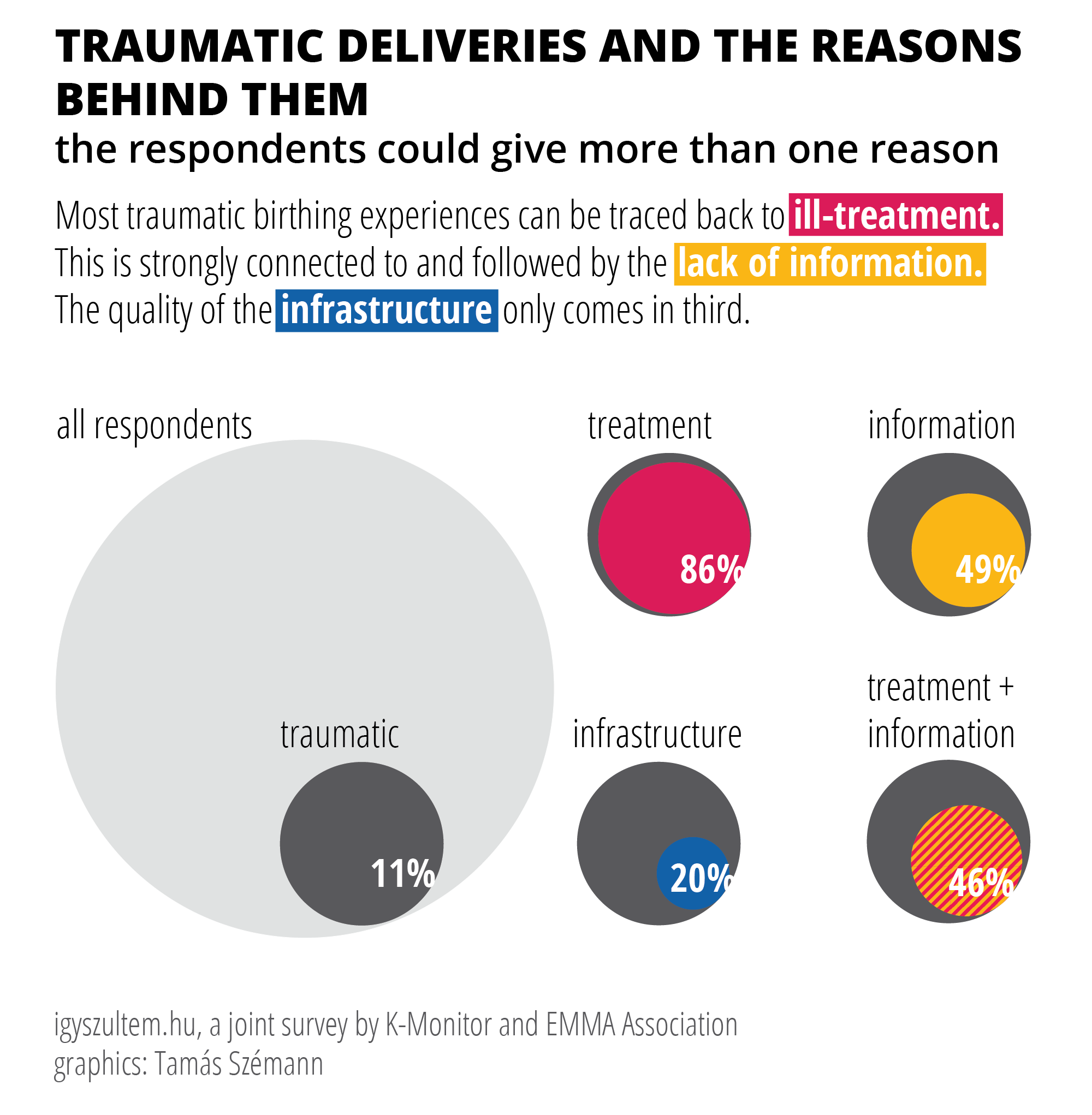
In the case of deliveries during the COVID pandemic, gratitude payments were less frequent, but those who did pay, paid more, exceeding the inflation rate. Those who pay are also more likely to be allowed to give birth with a birthing partner of their choice than those who don’t.
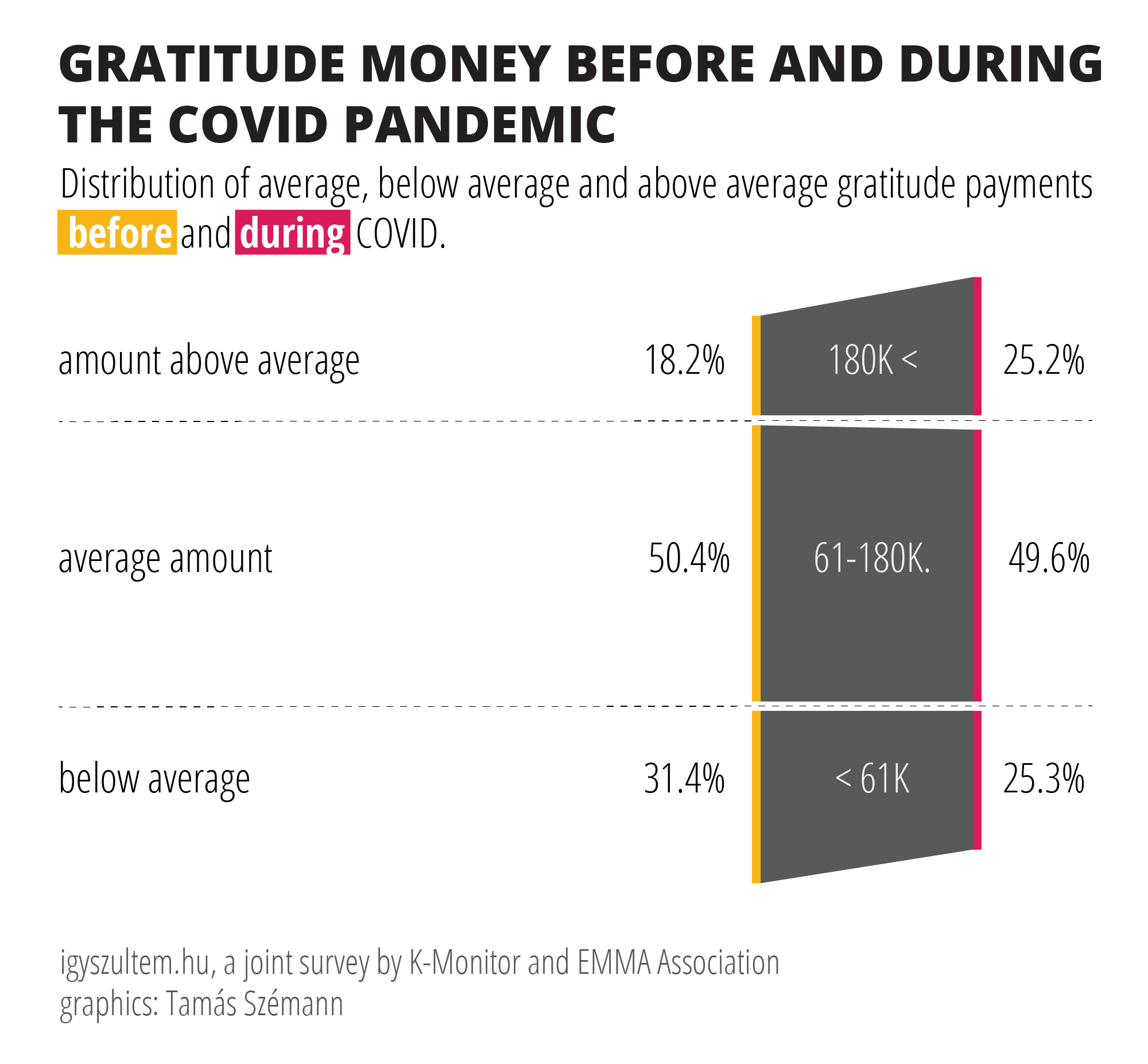
What Does the Future Look Like?
One of the main objectives of the ongoing reform of the health system in Hungary is to eliminate gratitude payments. How the long awaited increase in doctors’ wages, the ban of double practices or the lack of it (doctors using public hospitals to treat private patients), and the stricter punishment of gratitude payments will affect these findings remains to be seen.
Experiences of Hungarian mothers giving birth abroad
This analysis has shown that the system of gratitude payments is not only in place because of the low wages in health care, although that has certainly been a significant contributor to gratitude money being normal practice for such a long time. A sustaining factor at least as important is the lack of trust in health care institutions, which patients try to make up for by “buying” the services of the doctor believed to be the best. However, as experience has shown, gratitude money does not guarantee anything: the mothers-to-be might give birth with their chosen doctor more often and they might even be treated better, but the payment does not spare them a delivery with unwanted interventions if that is more convenient for the doctor.
We find it very unfortunate that the transformation underway in the health care system did not include a dialogue between legislation, professional organizations, and society – first and foremost broader groups of women – which would have made the goals and intents of the different groups transparent and revealed the problems of the system that need addressing. There is a risk that the new rules will not bring about substantive change if the trust of society in the quality of health care is not restored, and the envelope with money will continue to be ready in the pockets of two-thirds of the patients hoping for better care. And trust will be difficult to restore, if
- due to the lack of common protocols and preparedness, substantial differences between institutions remain,
- there is no clear separation of public and private services within obstetrics,
- there is no real communication and dialogue between doctor and patient as equals,
- there is no easily accessible data and information on the process and quality of childbirth,
- there is no feedback system replacing gratitude money when it is truly given out of gratitude,
- and there is no one to check whether – despite the higher wages – doctors still take the envelope.
At the moment it seems that the political consideration of the government, not to mess with tens of thousands of voters who would lose their right to select a doctor and the financial interests of those obstetricians who benefit from gratitude payments have a stronger impact on the reform than evidence, or the needs of patients. If maternity care remains an exception from the health care reform and double praxis isn't banned, the current flaws of the system will remain in place for another decade. On the other hand, an immediate ban could force doctors to leave their positions in public healthcare. That would soon lead to the privatization of the entire sector, a social disaster for many.
We hope that this survey will contribute to clarity in this topic and will provide a good reference point to track the changes in the quality of obstetric care and the role of gratitude money in the years to come.
This research was conducted by K-Monitor, our research partner was the EMMA Association. Data analysis was performed by Blanka Szeitl, data visualizations were done by Tamás Szémann. The completion of this research could not have been possible without the assistance of those who supported this endeavor as experts, volunteers or donors and the eleven thousand women who shared their experiences with us. Our project on gratitude payments in maternity care was supported by OSIFE.
Our original blog post and further publications on this topic in Hungarian can be found here.
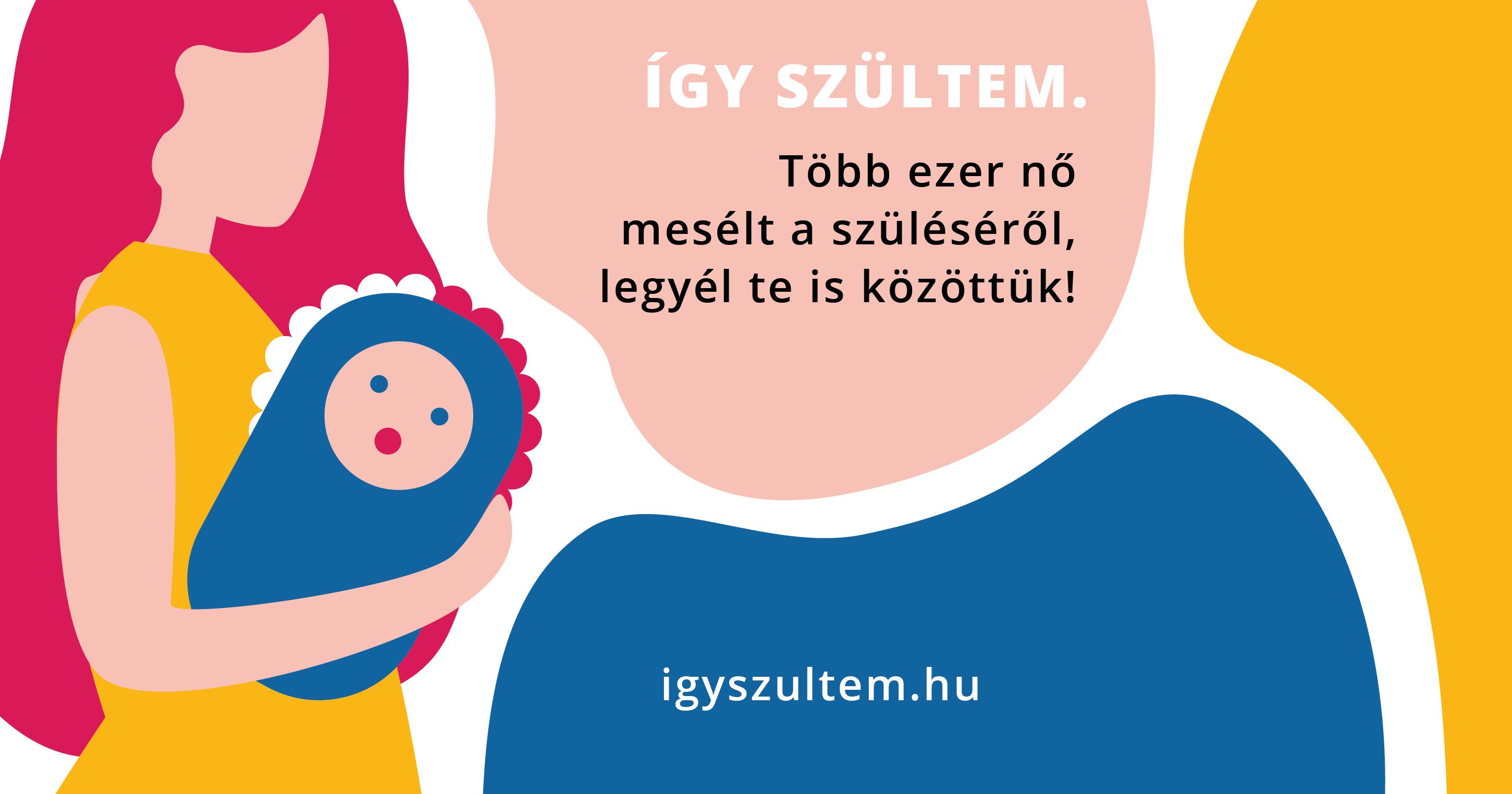
Címkék: english
2 komment
A bejegyzés trackback címe:
Kommentek:
A hozzászólások a vonatkozó jogszabályok értelmében felhasználói tartalomnak minősülnek, értük a szolgáltatás technikai üzemeltetője semmilyen felelősséget nem vállal, azokat nem ellenőrzi. Kifogás esetén forduljon a blog szerkesztőjéhez. Részletek a Felhasználási feltételekben és az adatvédelmi tájékoztatóban.


